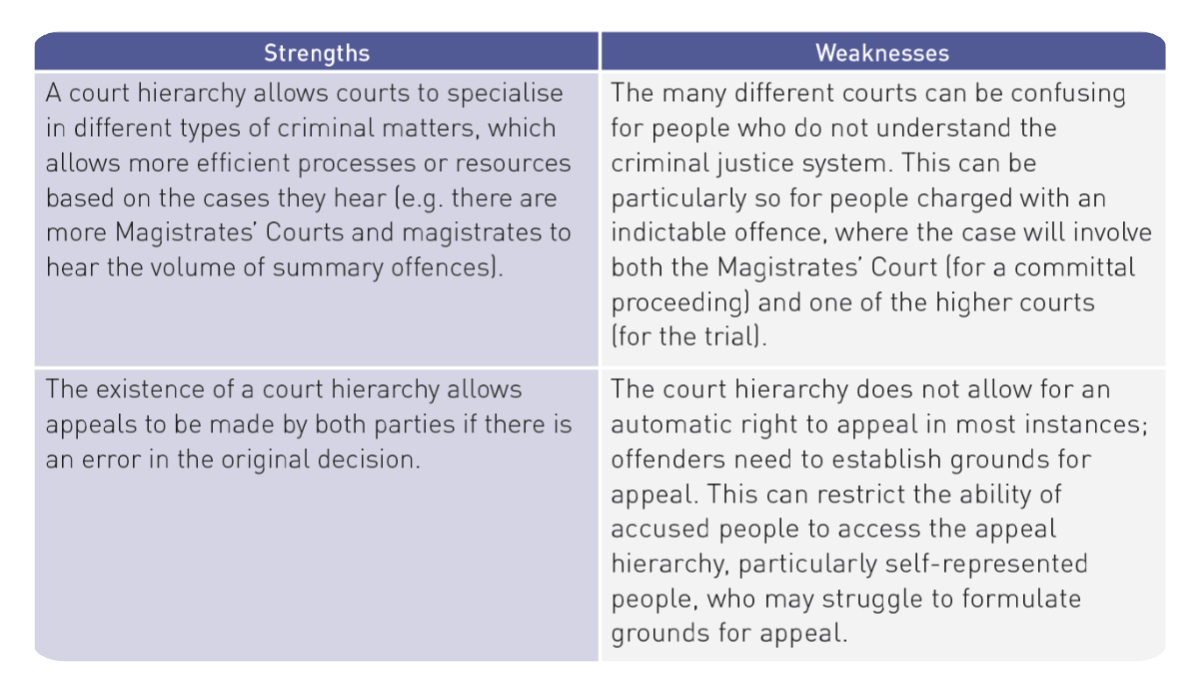KK8: Victorian Court Hierarchy
1/25
There's no tags or description
Looks like no tags are added yet.
Name | Mastery | Learn | Test | Matching | Spaced | Call with Kai |
|---|
No analytics yet
Send a link to your students to track their progress
26 Terms
Reasons for court hierarchy
appeals
sepcialisation
Jurisdiction
Jurisdiction is the power of a court to hear and decide a case
Types of jurisdiction
original jurisdiction
the power to hear a case for the first time
appellate jurisdiction
the power of a court to hear a case in which a decision is being reviewed or challenges (e.g. being appealed in a higher court)
Court hierarchy
The ranking of courts based on the severity and complexity of cases they hear
Victorian Court Hierarchy
high court of australia (federal)
supreme court of victoria (court of appeal)
supreme court of victoria (trial division)
county court
magistrates’ court
Magistrates’ Court jurisdiction
Original jurisdiction
summary offences
indictable offences heard and determined summarily
committal proceedings
bail applications
warrant applications
Appellate jurisdiction
no appellate jurisdiction
County Court jurisdiction
original
indictable offences except murder, attempted murder, certain conspiracies and corporate offences
appellate
appeals from the magistrates’ court on conviction or sentence
Supreme Court (trial division) jurisdiction
original
most serious indictable offences including murder, attempted murder, certain conspiracies and corporate offences
appellate
appeals from the magistrates’ court on points of law
Supreme court (court of appeal)
original
no original jurisdiction
appellate
appeals from the county court or supreme court (trial division)
appeals from the magistrates’ court where the chief magistrate decided the case
Appeals
An application to have a higher court in the hierarchy review a ruling (decision) of a lower court
If there are grounds for an appeal, a party who is dissatisfied with the outcome of a case can take the matter to a higher court to challenge the decision.
Parties in appeals
appellant: the party initiating the appeal
respondent: the party against whom an appeal in made
What does the system of appeals help to ensure?
The system of appeals helps to ensure fairness – if a mistake was made in the original decision, it can be reviewed and corrected by a higher court.
This provides an opportunity for unjust decisions to be amended.
Grounds for appeal
refers to the reasons or legal basis on which a person can challenge a decision made in a case
What are the grounds for an appeal?
Appealing because of the lenience or severity of a sanction imposed. For example, an offender may appeal on the basis of "manifestly excessive" – the punishment is so disproportionate or extreme that it is clearly unjust or unreasonable.
Appealing a conviction (only by the offender)
Appealing on a question of law. For example: incorrect law was applied, court misinterpreted a statute, court heard inadmissible evidence
What is the relationship between appeals and the court hierarchy?
Without a ranking of courts, there would be no process to appeal a case to a higher court, which would create unfairness if a court incorrectly decided a case.
Other information - appeals
An appeal does not involve rehearing all of the evidence and arguments of the original trial – it focuses on whether an error was made a trial.
If a material error has occurred, the appeal court may make a new order (e.g. quash a conviction, hand down a new imprisonment term, etc.).
Disagreement with the outcome of a case, without one of the grounds for appeal, is insufficient to challenge a ruling
Reason #2 - Specialisation
specialisation allows the courts to have developed their own area of expertise
Specialisation of Supreme Court (court of appeal)
Specialises in determining criminal appeals in indictable offences
Has expertise in sentencing principles
Specialisation of the Supreme Court (trial division)
Specialises in dealing with the most serious indictable offences (e.g., murder)
Has expertise in those types of crimes, such as the elements of murder
murder
Specialisation of the County Court
Specialises in dealing with indictable offences (e.g., drug offences, sexual offences, theft)
Specialisation of the Magistrates’ Court
Familiar with summary offences that are dealt with quickly and efficiency (e.g., drink-driving).
Committal proceedings
Bail hearings
• Bail hearings
Specialisation of the Children’s Court and Coroners Court
Specialises in crimes involving young people (Children's Court)
Specialises in investigating deaths and fires with suspicious circumstances (Coroners Court)
How does specialisation uphold poj?
Courts within the hierarchy become familiar with the types of cases they hear in their jurisdiction.
Thus, the court hierarchy enables legal personnel within each court to develop specialist knowledge and expertise in certain areas of criminal law – e.g., the Magistrates’ Court only hears summary offences.
This allows cases to be dealt with more efficiently (↑ Access).
It also encourages predictability in sentencing, as similar sentences are likely to be handed down in similar cases (↑ Fairness).
Strengths and weaknesses of the victorian court hierachy

Other reasons
administrative convenience
time and money
expertise & experience
minor matters determined locally
doctrine of precedent
Examples of specialised courts
magistrates’ court
drug court
family violence court
neighbourhood justice centre
koori court
county court
supreme court
high court